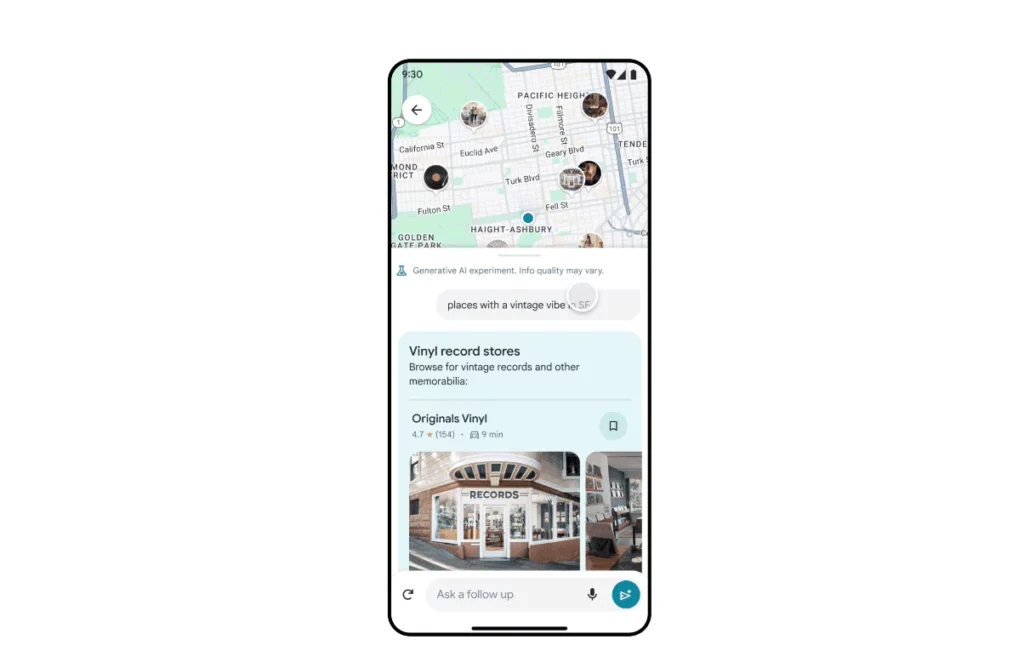Google introduces AI tools for Maps, transforming exploration. Users can now speak naturally to the app, prompting large-language models to analyze over 250 million places for personalized suggestions. As Google Maps evolves, this AI-driven enhancement promises a more intuitive and tailored exploration experience, marking a significant shift in how users discover and navigate places. This transformative feature, currently in early access, signifies Google’s commitment to enhancing user experiences through innovative technologies.
Table of Contents
How Does This Work?
You’re in a new city, hungry, and unsure where to find a restaurant that caters to various dietary restrictions. With Google’s new AI tools in Maps, you can simply speak naturally to the app, asking for what you need. Google’s large-language models (LLMs) analyze information from over 250 million places and incorporate insights from the Local Guides community.
The AI not only provides recommendations based on your initial query but also remembers your preferences. If you’re into a vintage vibe and you ask for a lunch spot, the AI will automatically look for places matching that retro feel. It’s like having a personal guide that understands your taste and preferences, making your exploration more enjoyable.

Let’s Dive into the AI-Enhanced Features
You’re in San Francisco, and you’re eager to explore vintage thrift stores. You ask the app, “Where can I find places with a vintage vibe in SF?” The AI dives into its wealth of information, considering photos, ratings, and reviews from the Maps community. What you get is not just a list but a curated selection complete with photo carousels and review summaries.
You can refine your search on the fly. Imagine it starts raining suddenly, and you need indoor activities. A simple query like “activities for a rainy day” brings suggestions like comedy shows or movie theaters. Want family-friendly options? Ask a follow-up question like “What about options for kids?” – and you’ll get suggestions like bowling alleys or children’s museums.
Why is Google Starting Small?
To ensure the thoughtful implementation and refinement of this feature, Google has initially rolled it out to select Local Guides members in the U.S. These Guides, a community of active and passionate contributors to the Maps community, play a crucial role in shaping the future of this AI-driven exploration. Google values their insights and feedback, aiming to enhance the feature based on real-world usage.
Google anticipates that, with valuable feedback from these early access users, the feature will gradually expand to more areas, providing an enriched exploration experience for users globally. This step-by-step approach ensures that as the feature evolves, it maintains its effectiveness and addresses user needs seamlessly.
Read Also: Discover Google’s Imagen 2 Upgrade, Transforming Image Generation
A Glimpse into Google’s AI Evolution
Google has been consistently integrating AI features into its products, marking a significant shift in how we interact with technology. From adding generative AI features to the Chrome browser to making AI-powered note-taking apps available to a broader audience, Google is at the forefront of refining AI technologies.
This move is in line with Google’s commitment to delivering not just directions but personalized and meaningful experiences through its products. With ongoing developments such as the Bard chatbot and the integration of AI tools into Pixel phones, Google is shaping a future where AI becomes an integral part of our daily interactions.
Read Also: Empower Your Pixel 8 with the All-New Circle to Search
Looking Forward
As Google unveils these exciting AI tools for Maps exploration, it marks just the beginning of a broader initiative to supercharge Maps with advanced capabilities. The future holds exciting possibilities for how people discover and navigate the world through Maps.
Imagine a Maps app that is not just a navigational tool but a personalized guide to the world. The introduction of generative AI is set to redefine how we explore, providing a dynamic and personalized experience for users. Google envisions Maps not just as a static map but as a responsive companion that understands and adapts to your needs.
The personalized and dynamic nature of this feature sets the stage for a more intuitive and responsive exploration journey, highlighting Google’s commitment to enhancing user experiences through innovative technologies. As this feature evolves and expands, users can anticipate a future where Maps becomes not just a navigational tool but a personalized guide to the world.

Read More: Apple’s Vision Pro Launch Countdown Sparks Excitement



